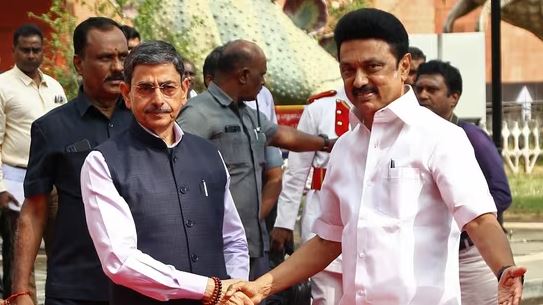
By K Raveendran
The Supreme Court strictures against the Punjab governor for sitting over the bills passed by the state assembly by questioning the validity of the house session that passed those bills are a verdict against what has come to be regarded as the standard operating practice of the Union home ministry to use governors for political ends.
A bench headed by Chief Justice of India DY Chandrachud and comprising Justices JB Pardiwala and Manoj Misra made a categorical declaration that it was not for the governor to doubt the validity of a session and it was well within the powers of the Speaker to decide when to adjourn or prorogue a house.
This is an emphatic stamp of disapproval for the use of governors by the Centre as a tool of political play between itself and state governments, particularly when the former and the latter belong to rival political parties.
Chief Justice Chandrachud asserted that in a parliamentary form of democracy, real power rests with the elected representatives of the people and warned the governors against ‘playing with fire’. “How can the governor say this…these are bills passed by elected members…Will we continue to be a parliamentary democracy? This is a very serious matter”, he added.
The bench noted that as per Article 200, the governor may either assent to the bill, return the bill for reconsideration by the house or reserve the bill for President’s assent. In the case of a money bill, the Governor has no option of returning the bill. The governor has only four options: give assent to the bill, withhold assent on the ground that it requires amendments, refers the bill to the President or return it to the state legislature concerned to reconsider it. If, on such reconsideration, the bill is passed again and is presented again to the governor, he has no option but to accord his assent. Because, in n accordance with the constitutional scheme, the governor is constitutionally bound to exercise one of the four options.
The decisive stand by the Supreme Court comes at a time when several opposition-ruled states have approached the apex court against the conduct of governors, who refuse to sign various bills passed by their respective assemblies on one pretext or the other. The court has sent notice to the Centre on a petition by Tamil Nadu government against governor R N Ravi delaying assent to bills passed by the state legislature. The petition seeks an outer limit for the time that is available to the governor to take a decision. Similar pleas by the Kerala government are also pending consideration of the Supreme Court.
Although there have been cases of blatant use of governors by the Centre in the past as well, such abuse has not been as common as it is today. In earlier times, the governors were appointed from among people with political stature who observed a certain level of propriety in their conduct. Many of them literally performed as constitutional head of their respective state governments and stayed away from day-to-day politicking. But today, the situation is entirely different. Persons picked up for the prestigious post are often those whose only qualification is their political loyalty. The result is that they have been acting like agents of the party in power at the Centre.
Vice-president Jagdeep Dhankar had virtually become an icon of gubernatorial conflict with the chief minister when he was governor of West Bengal. He has had a running battle with Mamata Banerjee, with the tussle often getting personal and bitter. The chief minister even once got Dhankar’s Twitter account blocked as the governor used his handle to criticise Mamata’s actions and policies on a day-to-day basis. The governor often dragged the state bureaucrats into the tussle, leading to administrative lock jams. There were unsavoury exchanges between the two sides, with the chief minister accusing the governor of breaching his constitutional mandate to destabilise her democratically elected government.
With Dhankar becoming the vice-president, the mantle has now fell on his successor Ananda Bose, who is of course no match to his predecessor’s antics, but nevertheless carries on the fight in his own way. Bose’s fight with the Mamata government has been hogging headlines, particularly in relation to the tussle over the state’s universities.
The worthy successor to Dhankar, however, may be the Tamil Nadu governor, who according to chief minister M K Stalin behaves like a BJP agent, whose actions are seen to be part of the saffron party’s bid to grow roots in the difficult south Indian state. Kerala governor Arif Mohammed Khan also has a stormy relationship with the Pinarayi Vijayan government and has been blowing hot and cold when it comes to responding to the routine political developments in the state. (IPA Service)
The post SC Strictures Against Gubernatorial Abuse Must Bring Some Sense To Centre-State Ties first appeared on Latest India news, analysis and reports on IPA Newspack.


